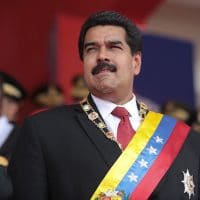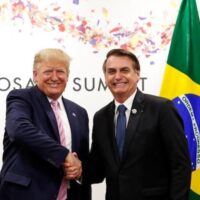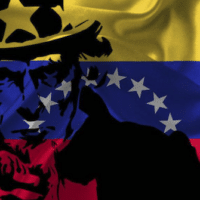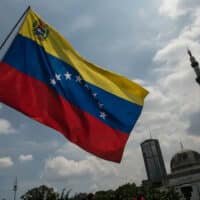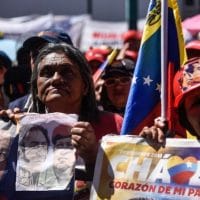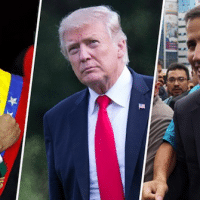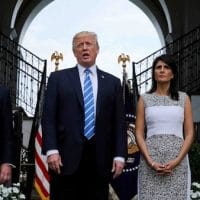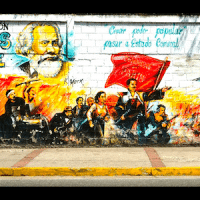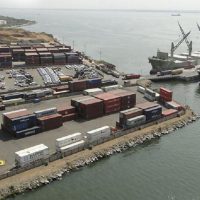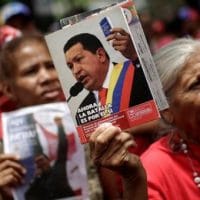-
‘Neoliberal and authoritarian’? A simplistic analysis of the Maduro government that leaves much unsaid
According to Hetland, the Maduro government is virtually devoid of any redeeming characteristics. Hetland refers approvingly to the claim made by Maduro’s harshest critics on the left, that his government and the right-wing opposition are “two sides of the same coin”.
-
Trump’s policy toward Latin America: Even anti-Communist Zealots in Miami don’t like it
The Trump administration’s volatility on foreign policy reveals internal divisions within Trumpism. But when threats and populism lose their momentum, the anti-communist hawks may get their way.
-
Prioritising anti-U.S. imperialism, Maduro’s Venezuela and the complexities of critical solidarity: An interview with Steve Ellner
Steve Ellner: “The basic contradiction of capitalism is at the point of production, the contradiction between the interests of the working class and those of capitalists.”
-
Venezuela’s presidential elections: Maduro plays hardball but there are drawbacks
Historian and political analyst Steve Ellner lays down the political stakes and US meddling ahead of Venezuela’s electoral race.
-
Objective conditions in Venezuela: Maduro’s defensive strategy and contradictions among the people
Venezuelan history and politics professor Steve Ellner examines Maduro’s economic policies and the contradictions that have arisen among the left.
-
What worries the U.S. most about Lula
Steve Ellner says opposition to NATO’s stance on Ukraine has created fertile ground for the expansion of a bloc of non-aligned nations, now with a progressive possibly at the helm.
-
The Impasse of the Latin American Left
As the Left in power returns, the lessons of the Pink Tide have become increasingly relevant. Recognizing governments’ well-conceived policies as well as their errors is key to understanding the comeback.
-
Center-Left convergence in Venezuela: A blow to U.S. interventionism
Steve Ellner argues that average Venezuelans understand that U.S. sanctions hurt them—and should be resisted.
-
The radicalization of U.S. policy on Venezuela
Steve Ellner examines the Trump Administration’s recognition of a shadow government and, in so doing, the U.S.’s violation of international law.
-
The New York Times Editorial opposing military intervention in Venezuela may do more harm than good
U.S. establishment liberals are using their opposition to Trump’s military threats as a cover to back economic sanctions currently wrecking the Venezuelan economy, argues Professor Steve Ellner.
-
López Obrador’s moment
It took Andrés Manuel López Obrador (AMLO) 12 years to become president-elect of Mexico, making history for Mexico’s Left as his party’s coalition also achieves a legislative majority. But the struggle has only just begun.
-
The New York Times’ uncanny comparison of Leopoldo Lopez with Martin Luther King
Journalistic standards simply don’t apply when it comes to the NYT’s coverage of Venezuela’s radical right-wing opposition, argues University of Oriente Professor Steve Ellner.
-
The implications of Marxist state theory and how they play out in Venezuela
The implications of Marxist state theories developed by Nicos Poulantzas and Ralph Miliband are useful for framing issues related to leftist strategy in twenty-first century Venezuela. A relationship exists between each of the theories and three issues facing the Chavista movement: whether the bourgeoisie (or sectors of it) displays a sense of ‘class consciousness’; the viability of tactical and strategic alliances between the left and groups linked to the capitalist structure; and whether socialism is to be achieved through stages, abrupt revolutionary changes, or ongoing state radicalization over a period of time. During Poulantzas’ lifetime, his concept of the state as a ‘strategic battlefield’ lent itself to the left’s promotion of ‘strategic alliances’ with parties to its right. The same concept is compatible with the ‘process of change’ in Venezuela, in which autonomous movements play a fundamental role in transforming the old state and the construction of new state structures.
-
Economic warfare in Venezuela
Given the thick haze of disinformation surrounding the economic situation in Venezuela, we thought it would be useful to publish the first chapter of The Visible Hand of the Market: Economic Warfare in Venezuela.
-
The campaign against the economic war and corruption in Venezuela
The resounding Chavista victory in the October 15 gubernatorial elections provides a golden opportunity to take bold measures to overcome shortcomings even while risking clashes with powerful individuals or groups.
-
Venezuela: Chavistas gain upper hand, big challenges remain
“I believe that failure to recognize the positive aspects of the Maduro presidency undermines efforts at international solidarity, which is very much needed at this moment of such intense hostility and threats on the part of European, North American and South American governments.”
-
The Venezuelan dilemma
I know a number of people in Venezuela and academia in the U.S. and elsewhere who I used to see eye to eye on with regard to Chavez and I now find them expressing total rejection of and even animosity toward the government. The only thing that binds us now is our common support for the need to defend Venezuelan sovereignty, and sometimes not even that.
-
Standoff in Venezuela
Venezuela has been rocked in recent weeks by almost daily protests and counter-protests, as right-wing opponents of socialist President Nicolas Maduro seek to bring down his government.
-
Interview with Steve Ellner: Is the Bolivarian Revolution a Populist Failure?
In part II of our interview with Steve Ellner, the Universidad de Oriente professor discusses a range of contentious issues in Venezuela, including the efficacy of state social programs such as the CLAPs, rentierism, and the Maduro government’s controversial Mining Arc, as well as the role of international solidarity. Part I of the conversation can […]
-
Interview with Steve Ellner: Democratization of PSUV Is Key to Chavismo’s Future
Distinguished Venezuelan history and politics professor Steve Ellner visited Caracas from September 26 to October 7 to teach an intensive seminar at the Venezuelan Planning School, titled “The Role of the Venezuelan State in the Transition to Socialism.” Venezuelanalysis‘s Lucas Koerner sat down with the long-time Universidad de Oriente professor to discuss a range of […]

